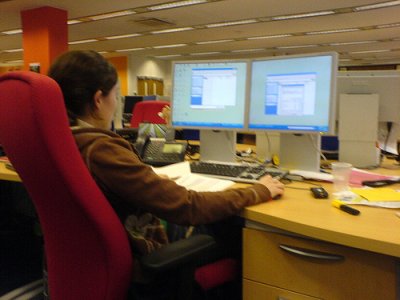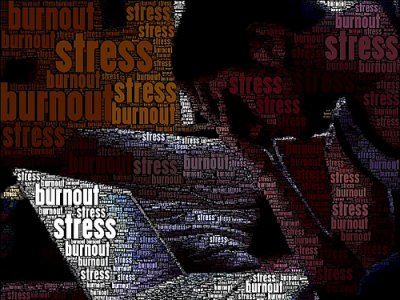The Impact of Technology in the Workplace on Mental Health – Is This You?

By: Jim Nicholson
The impact of technology in the workplace should be to automate procedures and reduce stress. The reality, however, is different.
The psychological impact of technology in the workplace
A report on workplace stress by insurance company AXA states, “stress in the workplace is strongly linked to the ‘always on’ culture, with almost three in every five Brits (59%) admitting to taking calls outside of working hours, while more than half (55%) check their emails.”
This ‘always on’ culture leaves us at risk of suffering adverse health issues due to stress and overwhelm. Add to this the physical strain that too much time in front of computers can cause, and the downside of technology becomes evident.
And many of us go home from our workplace computer to even more screen time, passing evenings on our phones, iPads, and televisions.
New research on the impact of screen time on wellbeing is divided and controversial, but links have been made to mood disorders, attention problems, obesity, and even lack of empathy.
So what has become the norm in the British workplace?
Do the below sound a little too familiar?
- Being on-call 24/7, typically with no extra pay
- Feeling obligated to check emails even before bed and upon waking
- Not moving around sufficiently, or having enough breaks from the screen, which affects eyesight and can result in Repetitive Strain Injury (RSI) (among other possible side effects mentioned above)
- Failing to have in-person conversations and work discussions with colleagues, even though they may be in the same room or close by
- Being expected to learn new software or technology skills on your own time.
What emotional issues are you experiencing as a result?

By: Matt Seppings
We all have days where work is a struggle. A range of emotions can surface during the day and after you leave work.
Although some issues may not seem particularly problematic in isolation, they can build up over time and threaten your mental wellbeing.
Here’s what to keep an eye out for:
1. Feelings of isolation.
Although technology is incredibly useful and allows us to communicate in an instant, it can also leave us feeling cut-off from colleagues, clients and friends, isolated from a lack of eye-to-eye, personal interaction.
In other words the longer you are staring at a screen, the less time you have to make real, sustainable connections, gauging people’s reactions to what you are saying, picking up on their nuances of speech, and generally interacting in ways that our brains were designed to do.
2. Inability to wind down.
Our minds don’t fully switch off when we are connected to technology. You are subconsciously on alert for incoming messages and emails, even if you do not realise it.
Using technology before you go to bed is a particularly bad idea. Despite the controversy around screen time research, the one undisputed conclusion was that the blue light of screens seriously affects your quality of sleep.
3. Pressure to complete work faster.
The idea that technology should make tasks faster means that some employers begin to expect a higher and often unrealistic output from employees. This will only increase as AI becomes a part of the workplace.
This of course often means that factoring in the flaws of technology doesn’t happen. The result is additional pressure, which can lead to burnt-out and dissatisfaction with your working life in general.
4. Fatigue and trouble focussing.

By: Florian Simeth
The way we read on screen leaves us more likely to multitask and be distracted. And a study on the way we read on screens found it leads to stress and fatigue faster than reading on paper.
5. Worry about losing your job.
Technology has been used to streamline businesses, cutting costs by replacing human workers with machines. If you fear your job will become redundant in the future, this can cause extreme worry and anxiety.
6. Impulsivity.
It’s not that technology would make you suddenly impulsive per se. But if you already have the character trait of impulsivity, email can see you say things on screen to your colleagues you would never dare say in person. The end result can be regret, stress, and extreme anxiety. Or, of course, losing your job.
So how might these issues affect you in practice?
Stress, loneliness, not enough down time, impulsive behaviours, and poor sleep are all factors that can lead to anxiety and depression.
Symptoms can include:
- Feeling run down all the time
- Losing interest in your hobbies, social life, and/or job
- Difficulty in making decisions due to overwhelm
- increasingly negative and pessimistic thoughts
- Lack of ability to focus on work tasks
- a tendency to always have a cold or the flu.
For more symptoms of depression, see our “Guide to Depression“. For anxiety, read our article, “When it is Time to Seek Help for Anxiety?”
Can you reduce the level of stress caused by technology?
Schedule in screen free time.
Consider committing to several hours a week where you don’t even check your phone but allow yourself no distraction from being in the moment.
Exercise.
Exercise gets you away from technology and into your body and the present moment. When you exercise endorphins are released into your system, making you feel happier. And it doesn’t need to be a huge workout – even walking around the block at lunch time can help.
Head outside into nature.

By: Kari Sullivan
Ecopsychology is a new branch of psychology that focuses on our interaction with the beyond human world. It increasingly shows the benefits for our psychological health. Again, if it’s only a local park at lunch time, it’s a start.
Switch off technology well before bedtime.
Experts now recommend you stop using screens at least one hour before sleep time, if not two.
Up your self care.
Eat foods that give you energy instead of deplete you, and watch out for habits that can increase depression and anxiety, such as overindulging in alcohol. Learn about good sleep hygiene. And take time each week to do things that help you feel good, whether that is a long hot bath or going for a massage.
Try mindfulness meditation.
Mindfulness is now evidence based for helping with anxiety and depression, and even increasing your focus. And unless you are using a mindfulness app, it’s a technology free experience.
Talk to your boss and colleagues.
There can be a culture of competition in some workplaces. But refusing to admit to stress and anxiety affects your performance and can even lead to a nervous breakdown, which is surely worse than admitting you are human. You may find that colleagues also experience similar issues, and discussing your situation with someone who understands can have positive results.
At the point you need real support?
Workplace stress is a very common reason people attend therapy. A counsellor can help you get to the root of the issue, as well as support you with gaining your confidence. You can learn the communication skills to set boundaries at work where required, and learn to make choices that energise over deplete you. Check with your workplace insurance, which might cover severals sessions with a therapist.
Harley Therapy connects you with career and workplace counselling in central London. Or try our new platform, which showcases therapists who work countrywide and via online.
Have a question about the impact of technology in the workplace? Or want to share? Use the public comment box below.





